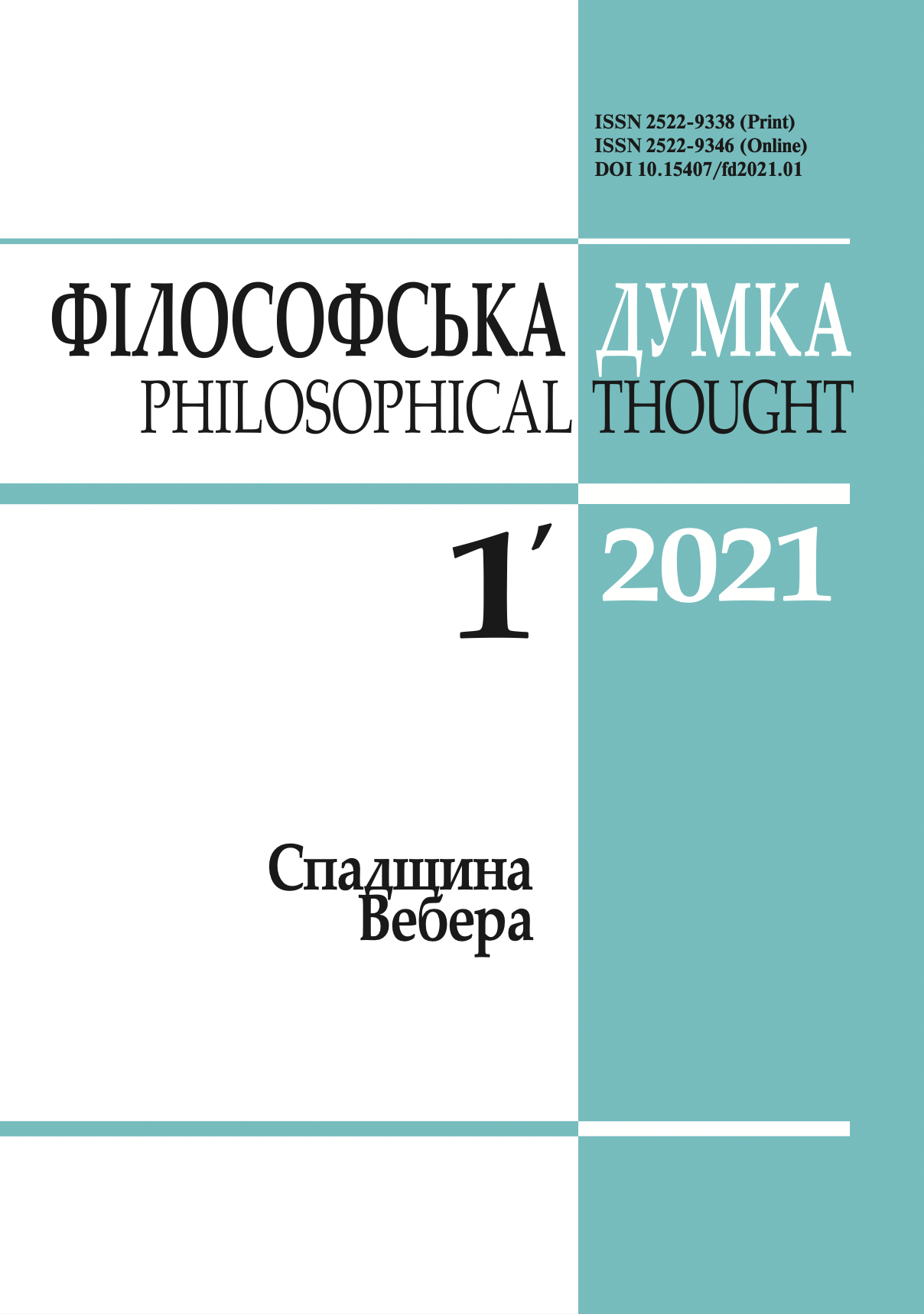Capitalism as religion: From Max Weber to Giorgio Agamben through Walter Benjamin
Weber's legacy: at the crossroads of traditions
DOI:
https://doi.org/10.15407/fd2021.01.105Keywords:
capitalism, Protestantism, secularization, desacralization, West, secular, anarchic, everyday lifeAbstract
The article, based on the work “Protestant Ethics and the Spirit of Capitalism” explores the concept of «capitalism» by Max Weber, as well as a critique of capitalism itself based on the texts of Walter Benjamin and Giorgio Agamben. All three authors have different views on the nature of capitalism. If Weber is positive about capitalism, Benjamin and Weber see it as a danger. Weber approaches the issue from the point of view of Protestant practice, Benjamin and Agamben see capitalism as a parasite that uses Christian theology for its own useful purposes. Weber writes about the “spirit” of capitalism, Benjamin and Agamben write about capitalism as a form of religion. Weber wrote that «unbridled lust» is by no means identical with capitalism, much less its «spirit». Weber characterizes capitalism through such virtues as honesty, punctuality, diligence, moderation. Benjamin suggested that «Christianity during the Reformation did not contribute to the advent of capitalism, but was transformed into capitalism». He writes that capitalism is perhaps the most extreme of all religious cults, because it is based on a purely psychological connection to the object being fetishized. This cult, devoid of ideology or theology, exists solely through the continuous performance of its rituals — the purchase of goods and their consumption. Agamben asks very important question: “if capitalism is a religion, how do we interpret it in terms of faith? What does capitalism believe in?” He writes that capitalism is a religion based on faith. Capitalism is not simply the secularization of the Protestant faith. Agamben writes that capitalism is a religion where faith and credit replace God. Ever since money became a pure form of trust, capitalism has become a religion in which money is the God.
References
Agamben, G. (2017). Capitalism as Religion. В: D. McLoughlin (Ed.), Agamben and Radical Politics (pp. 15-26). Edinburgh: Edinburgh University.
https://doi.org/10.3366/edinburgh/9781474402637.003.0001
Benjamin, W. (1991). Gesammelte Schriften VI (pp. 100-103). Frankfurt am Main: Suhrkamp. Benjamin, W. (2002). About the understanding of history. [In Ukrainian]. In: V. Benyamin, Selected works (pp. 39-51). Lviv: Litopys.
Benjamin, W. (2012). Capitalism as a religion. [In Russian]. In: W. Benjamin, The teaching of similarity. Media-aesthetic works (pp. 100-108). Moscow: Russian State University for the Humanities.
Bintsarovskii, D. (2016). Professional success as a sign of election? About Calvin, Calvinism, Weber and Post-Soviet Science. [In Russian]. The Reformed View, 2 (2), 5-54. URL: https://www.journal.ersu.org/art/18.pdf
Boldyrev, I. (2012). Bloch and Benjamin: one-way traffic. [In Russian]. In: The time of utopia. Problematic foundations and contexts of the philosophy of Ernst Bloch (pp. 182-261). Moscow: Higher School of Economics.
Debord, G. (1969). La societe du spectacle. Paris: Gallimard.
Debord, G. (2002). Society of the spectacle. [In Russian]. Moscow: Logos.
Eiland, H., Jennings, M. (2018). Benjamin. Critical life. [In Russian]. Moscow: Dielo.
Heers, J. (2014). The birth of capitalism in the Middle Ages. Money changers, usurers and big financiers. [In Russian]. St. Petersburg: Eurasia.
Kaube, J. (2014) Max Weber: Ein Leben zwischen den Epochen. Berlin: Rowohlt.
Kaube, Y. (2016). Max Weber at the turn of two eras. [In Russian]. Moscow: Dielo.
Merrifield, A. (2005) Guy Debord. S.l.: Reaktion Books.
Merrifield, A. (2015). Guy Debord. [In Russian]. Moscow: Ad Marginem Press.
Pohorilyi, O. (1998). Reading Weber. [In Ukrainian]. In: M. Weber, Sociology. Significant historical analyzes. Policy (pp. 479-495). Kyiv: Osnovy.
Scholem, G. (2014). Walter Benjamin. The story of one friendship. [In Russian]. Moscow: Grundrisse.
Taylor, C. (2007). A secular age. Harvard: Belknap Press of Harvard University Press.
https://doi.org/10.2307/j.ctvxrpz54
Taylor, Ch. (2013). Secular era. T. 1. [=In Ukrainian]. Kyiv: Dukh i litera.
Weber, M. (1963). Die protestantische ethik und der geits des kapitalismus. Tübingen: J. C. B. Mohr.
Weber, M. (2007). The life and work of Max Weber. [In Russian]. Moscow: ROSSPEN.
Weber, M. (2018a). Preliminary remarks on the "Collected works on the sociology of religion".
[In Ukrainian]. In: M. Weber, Protestant ethics and spirit of capitalism (pp. 25-37). Kyiv: Nash format.
Weber, M. (2018b). Protestant ethics and spirit of capitalism. [In Ukrainian]. Kyiv: Nash format.
Downloads
-
PDF (Українська)
Downloads: 238
Published
How to Cite
Issue
Section
License
Authors who publish with this journal agree to the following terms:
- Authors retain copyright and grant the journal right of first publication.
- Authors are able to enter into separate, additional contractual arrangements for the non-exclusive distribution of the journal's published version of the work (e.g., post it to an institutional repository or publish it in a book), with an acknowledgement of its initial publication in this journal.
- Authors are permitted and encouraged to post their work online (e.g., in institutional repositories or on their website) prior to and during the submission process, as it can lead to productive exchanges, as well as earlier and greater citation of published work (See The Effect of Open Access).


